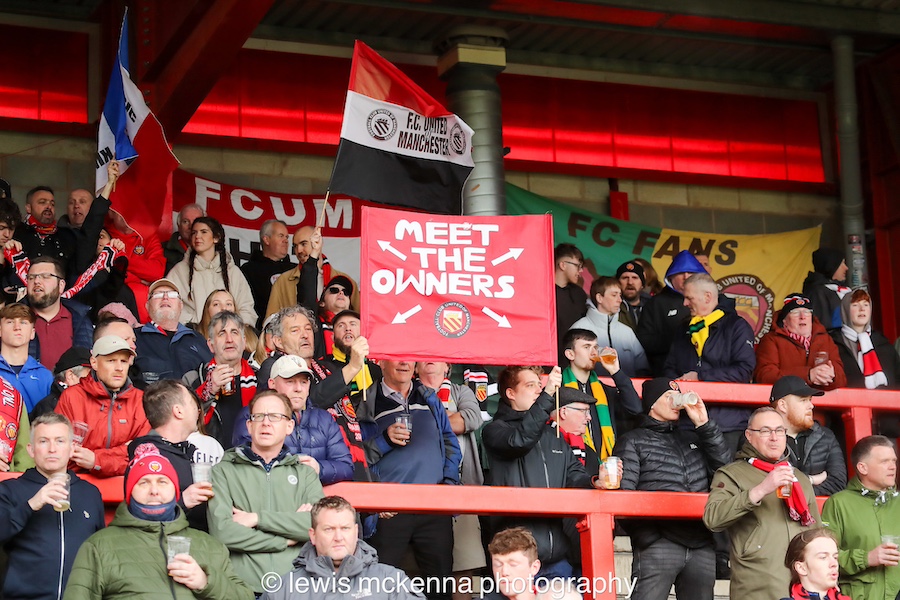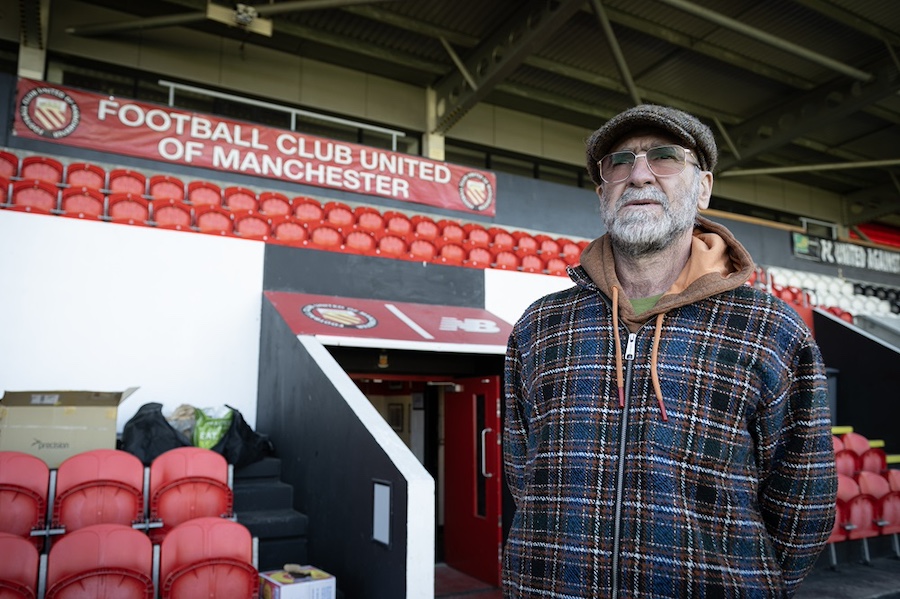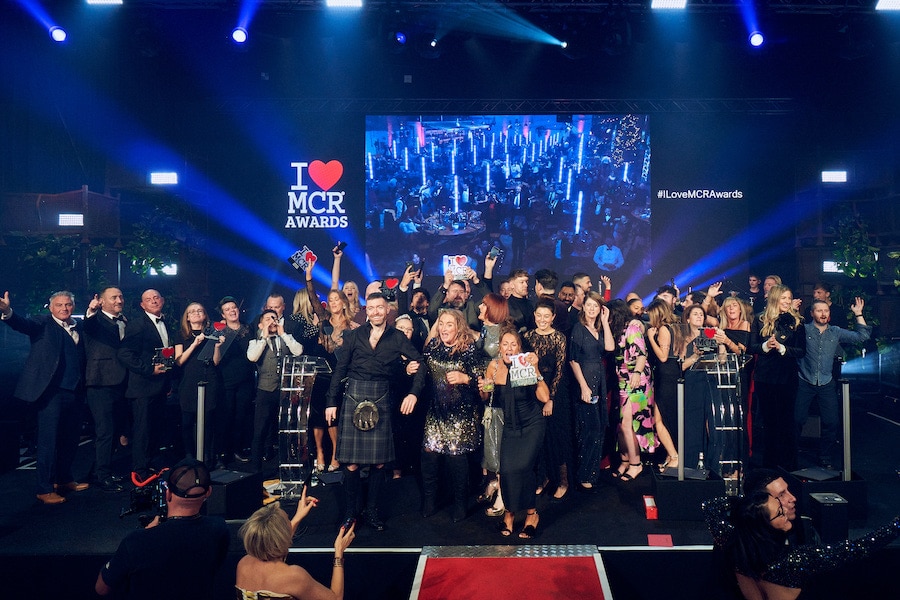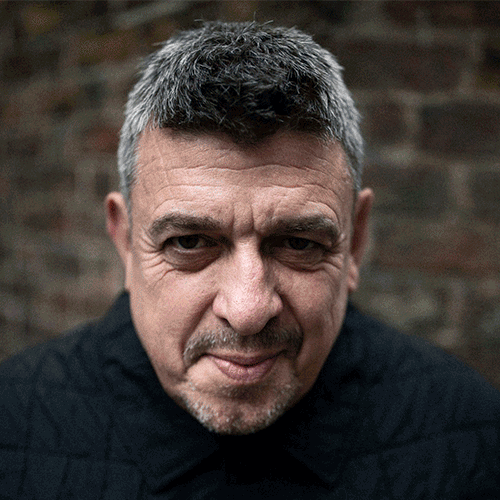20 years of the football club that refused to sell its soul
- Written by Thom Bamford
- Last updated 4 seconds ago
- FC United, Football

It was a Friday night in November 2010 when Mike Norton toe-poked the ball past Rochdale’s keeper in stoppage time.
A roar thundered from the away end, thousands of FC United of Manchester fans erupting in disbelief and jubilation.
These are the moments that every football fan lives for. It’s what football is about.
And it came not from millions spent or broadcasters’ whims, but from a club built on defiance and democracy.
The birth of FC United of Manchester

In 2025, FC United celebrates 20 years since its birth, not from a boardroom brainstorm or billionaire bankroll, but from the broken heart of Manchester’s football soul.
“The overriding emotion back in 2005 was anger,” recalled Paul Hirst, now a board member at FC United.
“Anger at what was being allowed to happen to Manchester United with the Glazer buyout. But there was also energy, fans decided to make a stand and try to change things.”
And change things they did.

The seeds of FC United were born of frustration, but watered by solidarity.
In May 2005, Malcolm Glazer completed his controversial leveraged buyout of Manchester United, a hostile takeover funded with debt that saddled the club with risk and alienated thousands of fans. It was the final straw.
Within weeks, public meetings were held, and by 14th of June 2005, FC United of Manchester was born. It was a club founded not on profit, but on principle.
“I wasn’t a founder, but once it was clear the club was happening, I knew that was my protest,” said Paul. “I was there for our very first game in July 2005.”
From those early days, a friendly against Leigh RMI, then the first competitive match away at Leek Town, FC United has always been so much more than a football team. It’s a movement. A reminder that the game belongs to the people who love it.
Our Club, Our Rules

FC United’s motto isn’t marketing fluff. “Our Club, Our Rules” means every one of the club’s 2,300+ members has an equal vote.
Whether it’s setting season ticket prices, choosing shirt designs, or electing the board, the power lies with the people.
“Supporter ownership isn’t just a legal structure. It defines everything we are,” said Paul. “The board is accountable to members. We answer to them. If they don’t like how we’re running things, they can vote us out.”
“There are no billionaires calling the shots here”

There are no billionaires calling the shots. No offshore interests. Just football lovers paying £25 a year to be co-owners of something bigger than themselves.
“We’ve never had a shirt sponsor in 20 years. That’s not just symbolic. We turn down real money to stand by our values,” Paul added.
In an era where the game’s top tier is a global brand and ticket prices soar beyond reason, FC United is proof there’s another way, and that it works.
While FC United’s roots are radical, its achievements are tangible.
Three consecutive promotions in its early years lifted the club from the tenth tier to the seventh. It reached the National League North in 2015 and has consistently punched above its weight in national cup competitions.
Highlights over the last 20 years?
“That 2010 FA Cup run was legendary,” Paul beamed. “Beating Rochdale on live TV, over half the 7,000-strong crowd were our fans. Then drawing Brighton away and holding them to a 1–1 draw? It was dreamland.”
And they haven’t stopped dreaming. From reaching the FA Trophy quarter-finals against Torquay, to playing Doncaster Rovers in the 2020 FA Cup on national television during lockdown, FC United’s footballing highs are as proud as any.
The club has also claimed European silverware, winning the FENIX Trophy (a UEFA-recognised competition for fan-owned and community clubs) twice, including a memorable campaign that saw them play at Milan’s iconic San Siro in 2023.
“We’ve had some fantastic moments, on and off the pitch,” said Paul. “What makes them special is that they belong to all of us.”
Opening Broadhurst Park

After nearly a decade of ground-sharing at Gigg Lane in Bury, FC United opened its own stadium, Broadhurst Park, in May 2015. The modern, 4,900-capacity home in Moston wasn’t just bricks and mortar. It was built with £2 million raised by fans through a groundbreaking community share offer.
“It’s like owning your own home,” Paul said. “There’s pride and responsibility in equal measure.”
Broadhurst Park isn’t just a venue for football. It’s a hub for art, music, and community. Every matchday features live bands, spoken word acts, and a supporters’ bar run entirely by volunteers. Murals, banners, and flags celebrate not just football, but Manchester’s working-class roots and musical heritage.
“You won’t find another matchday experience like it,” Paul said “It’s culture, identity, and belonging rolled into one.”
Eric Cantona joins FC United of Manchester

When Manchester United legend Eric Cantona became a co-owner of FC United in 2025, it made headlines, but not because of celebrity glitter. Cantona’s words struck deeper.
“We are a great club. People around the world should join FC United,” he said.
The former Red Devil admired the very thing the Premier League has largely lost – its soul. In FC United, he saw what football once was, and what it could be again.
Amazing value season tickets
From its refusal to accept shirt sponsorships to £21 season tickets for under-18s that haven’t increased in 20 years, FC United walks the walk on affordability.
“Affordable football is one of our core values,” Paul explained. “It’s why we’ve kept youth tickets frozen for two decades. We’re thinking about the next generation.”
For a kid growing up in North Manchester, where Premier League ticket prices can feel like a joke, FC United offers something priceless: access.
“Football isn’t just on TV or YouTube. There’s nothing like being part of it,” Paul said. “If the Premier League doesn’t feel like it’s for you, come and try FC United.”
When the FA decided to scrap FA Cup replays, a move that benefits Premier League giants but hurts lower-league clubs, FC United didn’t stay silent.
“It’s a blow to the proud history of the Cup,” said Paul. “Football isn’t just the top 20 clubs. Every club in the pyramid matters, even ones with 20 fans.”
Campaigning for better governance in football
The club actively campaigns for fan rights and better governance, not just for itself, but for everyone who loves football.
Chairperson Nick Bloom said: “This is a club that has stayed true to its roots, from choosing not to have a shirt sponsor for twenty years in the fight against rampant commercialism, to investing in one of Manchester’s most under-served communities.
“We’re proud of what we’ve built together, and even prouder to still be fighting for something better in football.”
A huge part of the local community
When Covid-19 struck, FC United didn’t retreat. It repurposed its supporters’ bar into a community food hub. It became a Living Wage employer. It launched programmes in education, health, inclusion, and youth development.
“Yes, there’s football on Saturdays,” Paul said. “But what happens on the other six days of the week is just as important.”
And in Moston, a community that once feared a new stadium might bring problems, FC United is now a trusted neighbour.
“We’ve worked hard to earn that trust,” Paul reflected. “We want to prove that football can be a force for good.”
Celebrating 20 Years of FC United of Manchester

The 20th anniversary season is a time for reflection, but also celebration. On the 18th of May 2025, Broadhurst Park will host a special Legends Game: FC United vs Manchester United Legends. Two clubs. One soul.
You can get tickets to this event by clicking here
Events will run throughout the year: from fan-led festivals to community showcases and youth projects.
“It’s about standing shoulder to shoulder with the people of Manchester,” said Nick Boom.
“This club was never just about protest. It’s about building something better.”
The road ahead for FC United of Manchester
So, where does a fan-owned club go next?
“Some say our ceiling is the lower reaches of the Football League,” Paul said. “Maybe. But the real question is: how far can we go while staying true to our values?”
FC United doesn’t want to be a Premier League juggernaut. It wants to be proof of concept that football can still be about people.
“We want to be known globally as a club where fans come first,” Paul said. “We’ve had people committed for 20 years. If we keep that spirit alive, we’re on the right path: wherever we are in the pyramid.”
As the club moves into its third decade, it carries the same defiance that sparked its founding, and the same hope that fuels every chant on the terraces.
In an era of global franchises and commercial excess, FC United remains a radical idea: that football belongs to fans, not financiers. That culture matters more than clicks. That a club can be built on love, not leverage.
And if you listen closely on matchday, under the flags and flares and falling skies of Moston, you’ll hear it: not just a chant, but a promise.
“Our Club, Our Rules.” Always.
What’s happening at FC United of Manchester?
You can find out more about what’s happening at FC United of Manchester on their website here
- This article was last updated 4 seconds ago.
- It was first published on 19 May 2025 and is subject to be updated from time to time. Please refresh or return to see the latest version.
Did we miss something? Let us know: [email protected]
Want to be the first to receive all the latest news stories, what’s on and events from the heart of Manchester? Sign up here.
Manchester is a successful city, but many people suffer. I Love Manchester helps raise awareness and funds to help improve the lives and prospects of people across Greater Manchester – and we can’t do it without your help. So please support us with what you can so we can continue to spread the love. Thank you in advance!
An email you’ll love. Subscribe to our newsletter to get the latest news stories delivered direct to your inbox.
Got a story worth sharing?
What’s the story? We are all ears when it comes to positive news and inspiring stories. You can send story ideas to [email protected]
While we can’t guarantee to publish everything, we will always consider any enquiry or idea that promotes:
- Independent new openings
- Human interest
- Not-for-profit organisations
- Community Interest Companies (CiCs) and projects
- Charities and charitable initiatives
- Affordability and offers saving people over 20%
For anything else, don’t hesitate to get in touch with us about advertorials (from £350+VAT) and advertising opportunities: [email protected]

From market stalls to City Hall: Carmine Grimshaw is Manchester’s new Lord Mayor

How volunteers at a Manchester community allotment are saving bees

First look: Ancoats Green reopens after refurb with playground and mobility hub

From lonely to loved – How pensioners are finding their second family in New Moston

Best bars and pubs to watch the football and live sport in Manchester
















